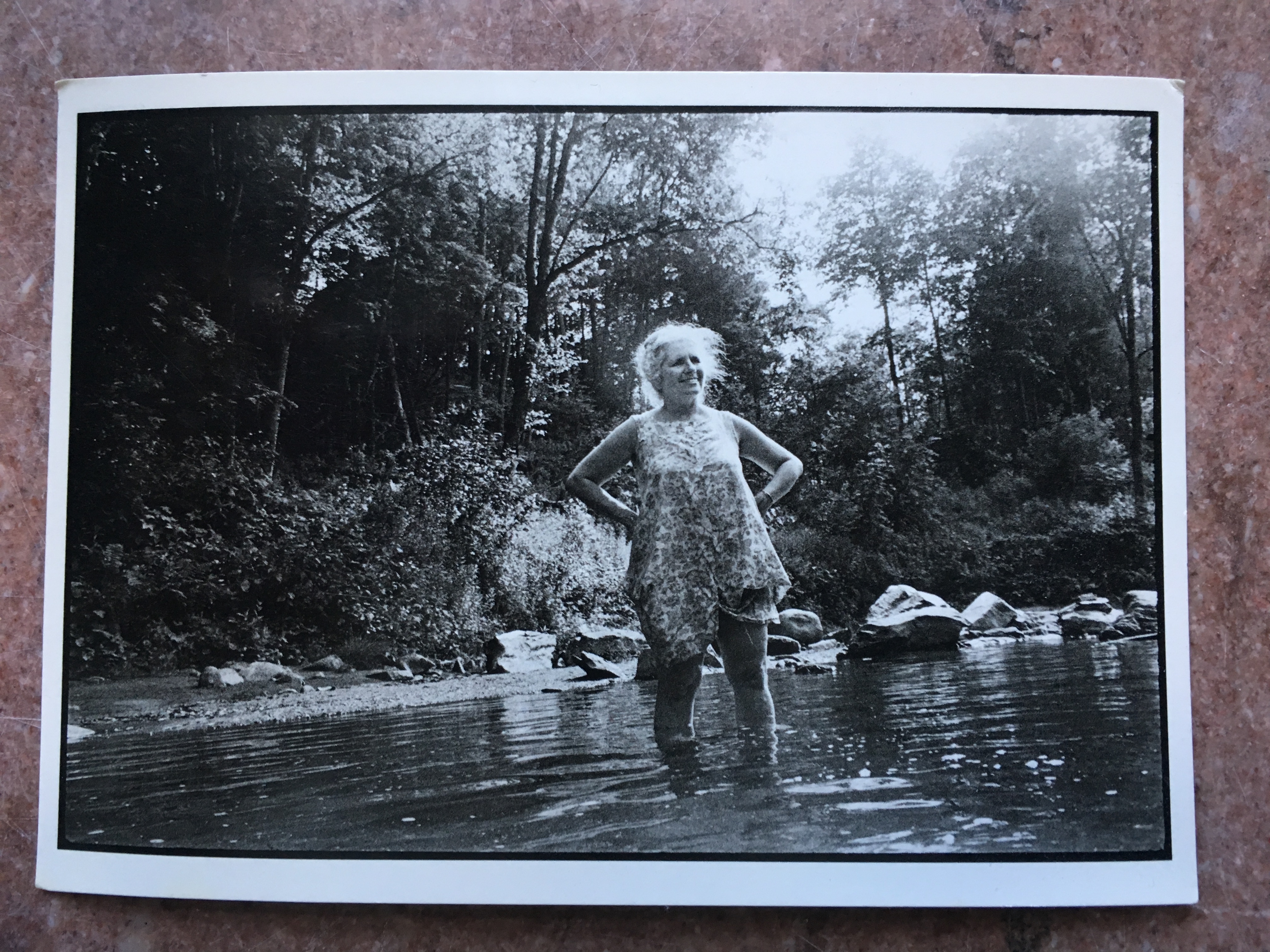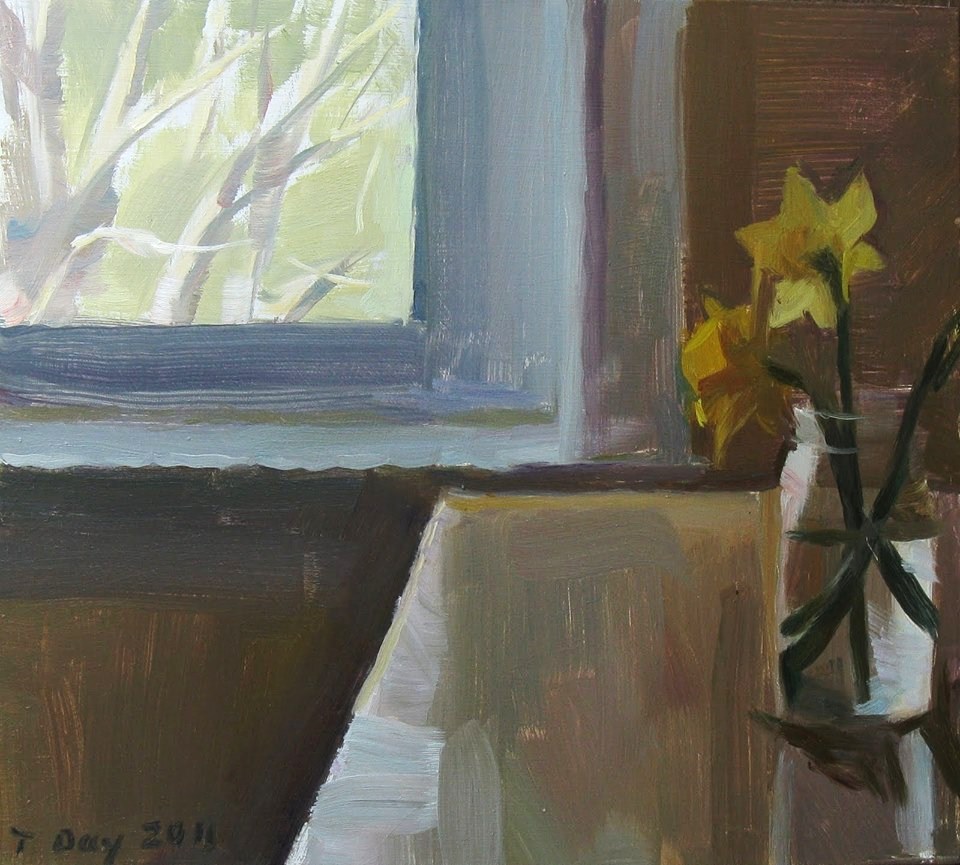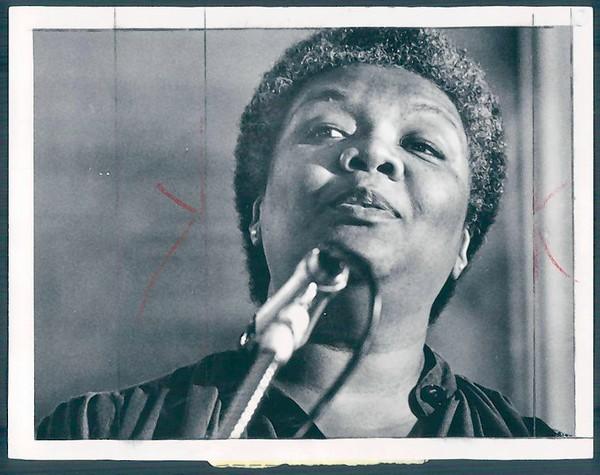If you find yourself half naked
and barefoot in the frosty grass, hearing,
again, the earth’s great, sonorous moan that says
you are the air of the now and gone, that says
all you love will turn to dust,
and will meet you there, do not
raise your fist. Do not raise
your small voice against it. And do not
take cover. Instead, curl your toes
into the grass, watch the cloud
ascending from your lips. Walk
through the garden’s dormant splendor.
Say only, thank you.
Thank you.
Love in the time of coronavirus
Love in the time of coronavirus
Do not travel. Do not go to community events.
Buy a lot of food at once, and go to the store less frequently.
Sleep as much as you can, sleep when darkness comes.
Nourish yourself with water and three good meals
and don’t ask more of your body than it is willing to give.
Take your herbs, wash your hands, drink water,
wash your hands, call your grandmother to see how she is doing.
Discuss the state of the world with your neighbors
at the post office, and with strangers
at the cafe. Speak honestly with them about your fears
because this will diminish them and bind you to each other.
Stay at home during the day,
and clean it in between work projects.
Buy stamps for letters you may write later.
Check on your supplies of soaps: for your hands,
for your body, for your laundry, for your floors.
As your town government tough questions, like:
Are you prepared for this?
As yourself tough questions, like
Am I prepared for this? Are my friends, my family?
Call your parents. Call your friends with babies.
When the house feels small, make something new
for it, or fix something old.
If possible, eat the greens that grow outside your door,
drink the remedies that grow outside your door.
Read poems. Read novels. Watch old films, or new ones.
Watch that well-produced Netflix show about cheerleaders,
read interviews with people you admire,
read writers who are long dead — they too lived
through disease, panic, extinctions.
Rebel against the idea that this is how things are now
and there is nothing we can do about it.
Consider all the ways that life is long
even as it feels taut, even as your breath gets caught
in your throat, your chest, even as you worry
each time you sneeze, or have a tickle in your throat.
Do something good for yourself that you’re not used to doing—
like saying no to plans with people who diminish you,
like brushing your hair for a long time after the shower
just for the pleasure of bristles on your scalp.
Cook yourself something very intricate
using the spices in your home that rarely get used.
Cook something in the oven that takes all day
and come out soft, and yielding, and rich.
Clip your toenails, pumice your heels, soak your feet.
Label and sort the pile of papers that you side-eye daily.
Run up a hill and roll back down it like you used to
when you were a kid. Did your pants get wet? All the better.
Change your pants, make a pile of old pants to donate.
Make a pile of old towels, old hats, old forks to donate.
Roll up the rug and sweep underneath it.
Sharpen all your pencils, throw out all the pens that don’t work.
Watch an old-school exercise video and do your very best
to execute all the moves correctly.
Take a bath in water as hot as you can stand it
while rereading a novel you loved as a teenager
which will sound nothing like how you remember it.
Peel an apple slowly while looking out the window
at the birds who know nothing of our pandemic.
Find out where in the moon cycle we are
and watch for the moon as night descends.
Open the door, smell the air, close the door, smell your home.
Name your house and draw the name on wood, on paper.
Burn herbs on a ceramic plate.
Watch a tutorial about how to braid hair
the way your childhood idol always braided hers.
Buy more eggs than you usually do
and make pasta. Make sauce. Eat
with whomever is in your home, or bring the meal
to someone who is at risk of getting sick.
When you go out, nod to each person you see,
as each of them is also undergoing this crisis.
Think of America as your people,
think of all countries as your people,
look around your house and see all the people
in all the countries who made all your things
with their time, their bodies.
Sing like a child, laugh like a child,
accept the childlike outbursts
that may come from your mouth.
Listen to the news, but do not watch it.
Or: read the news but do not listen to it.
One form of the news is enough.
Make a list of the things that have happened in your life
that made you laugh so hard that food or fluids
catapulted from your face. Call your friend
to help you remember the details of one of them.
Find the family heirlooms in your home and look at them,
really look. Think about how they were made,
from what materials. Consider your own body’s materials,
and how to mend and care for them.
Consider this crisis a climate crisis;
consider this planet a place where you actually live,
not just a theory, not just a globe in space,
a photograph you have seen a million times.
Even as all the hard questions come at once,
remember also: spring is on its way. And summer.
Remember that your body is your house, your home,
your haven, your hideaway. Breathe air into your nose
and out your mouth. Whether or not you are a parent,
you are a parent to your own entire being.
Watching old tv shows can be medicine. Doing stretches
can be medicine. Baking bread can be medicine.
Cutting a loved one’s hair can be medicine.
Wine can be medicine, pop music can be medicine,
watching a chipmunk catapult off a rock can be medicine.
Organizing the photos on your phone can be medicine.
Detailing your own car can be medicine.
Using a stick to divert the direction of flowing water
in the road can be medicine. Your children
are your medicine, and you are medicine
to your parents. You can be medicine to others
in ways you never expected, just by calling,
just by video calling, just by writing an email,
just by sending something in the mail,
just by sitting at home and making friendship bracelets
like you did at summer camp when a summer
was a lifetime you’d live through with delight.
This is not a time of delight, not a time of light,
though the light is returning to us each day,
the days lasting longer, the birds arriving to build.
So what can we build inside our own homes
that wasn’t already there, and what can we build
between each other that wasn’t already here
so that the next time this happens to us
we will have already built a home for this fear,
we will have constructed the walls out of love
and the doors out of love and we will sing to each other
through the windows out of love and feel held, though untouched.
— Taylor Mardis Katz, March 13, 2020
Ideas for New Seltzer Flavors
- Blueberry Fritatta
- Kaleberry Burst
- Raspberry Rhubarb Radicchio
- Strawberries ‘N Creamed Corn
- Pineapple Green Apple
- Bacon Boysenberry
- Seaweed Surprise
- Apple Cinnamon Soybean
- Mint Chocolate Chervil
- Cabbage Creamsicle
- Cucumber Catsup
- Muskmelon Mélange

Poem on the last day of the year, 2018
I resolve to stop wanting what I don’t have
or work towards getting it
but not doing the first without the second
(because that hasn’t gotten me anywhere).
I will be ambitious and believe
that I deserve to be paid well
and ask for a price for my work
that will allow me to support my family
and still have time to take care of my child.
When I start worrying
about why certain people
don’t seem to like me
(or at least don’t invite me to their parties)
I will instead focus on the people
who I know do like me
who in fact love me
and whom I love.
I will get rid of the things
that I keep in my life
out of a sense of duty
instead of a sense of joy.
It’s okay to look tired.
I vow to value moving my body
as highly as I value
cleaning the house
getting work done for clients
grocery shopping.
I am a spigot
and like a spigot
I can be shut off
and when I am off
that is called conserving water
and when I am on
all the poems will come flowing out.
Do I call my friends enough?
Do I call my family members enough?
I try to write letters, send texts,
send emails, stay in touch.
But I could do more.
Cobwebs appear out of nowhere.
No. False.
Cobwebs are the abandoned homes
of spiders.
If I ignore them, they will go away.
False again.
Resolution: I will clear out the cobwebs.
If a poet sings a poem
to the woods, are the trees
strengthened by her words?
Of course they are.
Just as the poet is strengthened
by the soundless stature of trees.
I clench my jaw and I furrow my brow
but there are ways to help myself unclench
and I will focus on them next year
especially before falling asleep.
Revelation of 2018:
lattes
are overpriced coffees
made with shitty milk.
I am now more prepared
to have a goat one day
since having a baby
because he bleats for his breakfast
and so will she.
(And because I too
have produced milk
& so will never take hers
for granted.)
Making the bed takes two seconds
and makes me feel better about my day.
Instead of anxiously haranguing people
in my head
regarding their purchases of
bottled water
body wash with blue micro scrubbers
out-of-season raspberries
since all of these things are killing the earth
in their own special and hideous ways
I will instead work to make my own life more sustainable
and brainstorm ways to speak
calmly
about my climate change fears
to the people I love.
I will stop caring
about whether people judge me
for what I buy at the grocery store.
I will do the hard thing first
(the thing I least want to do)
because then the rest will be gravy.
“cutting greens” by lucille clifton
Made some sauerkraut today with green cabbages, beets, carrots, scallions, and cumin. It’s getting acquainted with itself in 2 crocks on the bookshelf.
& then I remembered this poem. (& then I also found out that lucille clifton has written many books for children (!) and put the first one on my “birthday presents for baby” list.)
cutting greens
curling them around
i hold their bodies in obscene embrace
thinking of everything but kinship.
collards and kale
strain against each strange other
away from my kissmaking hand and
the iron bedpot.
the pot is black,
the cutting board is black,
my hand,
and just for a minute
the greens roll black under the knife,
and the kitchen twists dark on its spine
and I taste in my natural appetite
the bond of live things everywhere.
— Lucille Clifton
Poem: “During the Middle Ages” by Camille Guthrie
Went to a Literary North event w/ a friend on Saturday featuring the poet Camille Guthrie and the short fiction writer Peter Orner, both of whom are smart lovely people who shared memorable sentences with us (a small audience/thirsty for their thoughts and works/ready with our questions).
As usual I almost enjoyed the talk about the writing as much as the writing itself. And then on the way home I read this poem out loud to my friend as she drove and we LAUGHED and we SNORTED and we LAUGHED and cried “Genius!” and LAUGHED.
During the Middle Ages
O God I am so fat
I cry all the time
A kitten scrubbed with a toothbrush online makes me sob
I’m so heartless seven species of bees
Are now endangered and I didn’t do a thing
Didn’t even send any money
To anybody doing any good
And I can’t lose any weight I skipped yoga
I’m so hot all the time so broke
So pathetic no wise investments
Should’ve bought a 7-Eleven on a busy corner
When I was seven or eleven
Nobody wants to lick my neck
Nobody wants to hold my hand at the doctor’s office
Nobody to grow old with me I’m so crabby
To pluck my beard feed the cat I don’t have
And read me endless Russian novels at night
All the ones I still haven’t got to so greatly depressing
Where are you handsome? Are you
Driving in your car to come visit me
Bringing a bottle of wine & a present so gallant?
A new translation of Akhmatova? I love it!
No? Well, I guess it’s better than living
In the real Middle Ages when
Some shithead priest threatens you with hell
To pocket your last coin and there’s no Tylenol
So you have to suck on some skullcap seeds
And knights race around knocking you down
To take your maidenhood with pointy lances
And you have to work as a midwife with no birthing tub
Nobody washes their hands or votes
Nobody knows about DNA or PMS
There’s nothing to read even if you can read
Except boring doctrines or Spiritual Exercises
By Gertrude the Great, I’m not even kidding
Yes, there’s Dante Chaucer and some sagas
But it’s not like you’d get near those books
You’d be lucky to have some jerk recite the latest
By Wulfstan the Cantor by campfire
Before he beheads your uncles
And forces you to rub salve on his abs
You know you’d be sweating in a field at twenty-two
Dying from your tenth pregnancy by the bailiff
Courtly love? Not a lot of it I bet
Some doctor would drill a hole in my head
To let the demons out because I’d be full
Of black bile as I am today
It would be a very hard time
When the sun revolves around the earth
And kings are just unbelievably selfish
And it’ll be a really long time before Pop Art
And meerkat videos and cotton candy
And Kurosawa and fish tacos and girl bands
Everything’s just so bad and you have buboes
Hopefully I’d get shoved into a nunnery
To have some ecstatic experience with mystical Jesus
Or better I could be a hardcore samurai
Laying down justice on the heads of corrupt lords
But that was tough work, dirty work
You’re working for nobility who at any period
In history are the worst people in the world
And to be an unemployed ronin was lonely
Even if all the brothel ladies offer to scrub your back
Sometimes you just want a nice nap
And some Neosporin on your wounds
If only I could be like the divine Sei Shōnagon
Resplendent in silks with seven-layered sleeves
Writing in my room about politics and my lovers
I wish okay I could be her servant
Dusting the ink stone and fluffing her pillow
But even she found many hateful things
About living in the middle ages
Like crying babies messy guests and mansplainers
So irritating even way back then
You better shut up and take your medicine
— Camille Guthrie
Grace Paley (poem & photograph).
HERE
Here I am in the garden laughing
an old woman with heavy breasts
and a nicely mapped face
how did this happen
well that’s who I wanted to be
at last a woman
in the old style sitting
stout thighs apart under
a big skirt grandchild sliding
on off my lap a pleasant
summer perspiration
that’s my old man across the yard
he’s talking to the meter reader
he’s telling him the world’s sad story
how electricity is oil or uranium
and so forth I tell my grandson
run over to your grandpa ask him
to sit beside me for a minute I
am suddenly exhausted by my desire
to kiss his sweet explaining lips.

“To be of use” by Marge Piercy.
To be of use
The people I love the best
jump into work head first
without dallying in the shallows
and swim off with sure strokes almost out of sight.
They seem to become natives of that element,
the black sleek heads of seals
bouncing like half-submerged balls.
I love people who harness themselves, an ox to a heavy cart,
who pull like water buffalo, with massive patience,
who strain in the mud and the muck to move things forward,
who do what has to be done, again and again.
I want to be with people who submerge
in the task, who go into the fields to harvest
and work in a row and pass the bags along,
who are not parlor generals and field deserters
but move in a common rhythm
when the food must come in or the fire be put out.
The work of the world is common as mud.
Botched, it smears the hands, crumbles to dust.
But the thing worth doing well done
has a shape that satisfies, clean and evident.
Greek amphoras for wine or oil,
Hopi vases that held corn, are put in museums
but you know they were made to be used.
The pitcher cries for water to carry
and a person for work that is real.
“How To Be a Poet” by Wendell Berry.
How To Be A Poet
i
Make a place to sit down.
Sit down. Be quiet.
You must depend upon
affection, reading, knowledge,
skill—more of each
than you have—inspiration,
work, growing older, patience,
for patience joins time
to eternity. Any readers
who like your poems,
doubt their judgment.
ii
Breathe with unconditional breath
the unconditioned air.
Shun electric wire.
Communicate slowly. Live
a three-dimensioned life;
stay away from screens.
Stay away from anything
that obscures the place it is in.
There are no unsacred places;
there are only sacred places
and desecrated places.
iii
Accept what comes from silence.
Make the best you can of it.
Of the little words that come
out of the silence, like prayers
prayed back to the one who prays,
make a poem that does not disturb
the silence from which it came.
— Wendell Berry
SPRINGPOEM
All of a sudden, the yellowing—
coltsfoot
dandelions
forsythia
daffodils
& the chickening—
the neighbor’s chalkboard sign reads
FREE ROOSTERS
the other neighbor’s pullets
test their babywings out front
& the neon-greening—
the leafing out
leaves like fingers spreading into hands
the hillsides like a fabric
of chlorophyll’s talents
& the perennials—
the miracle of having only
to plant something once
to receive its joys
each year



